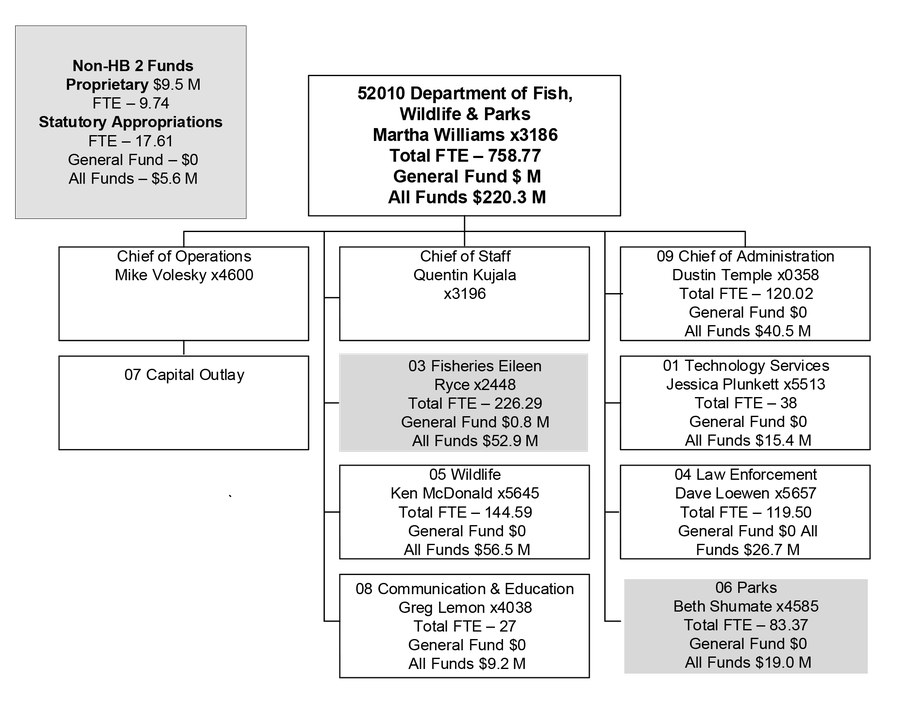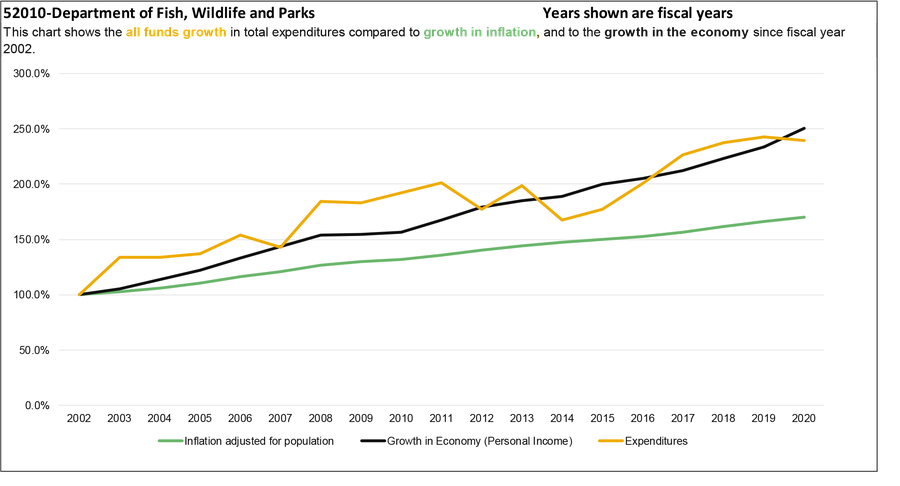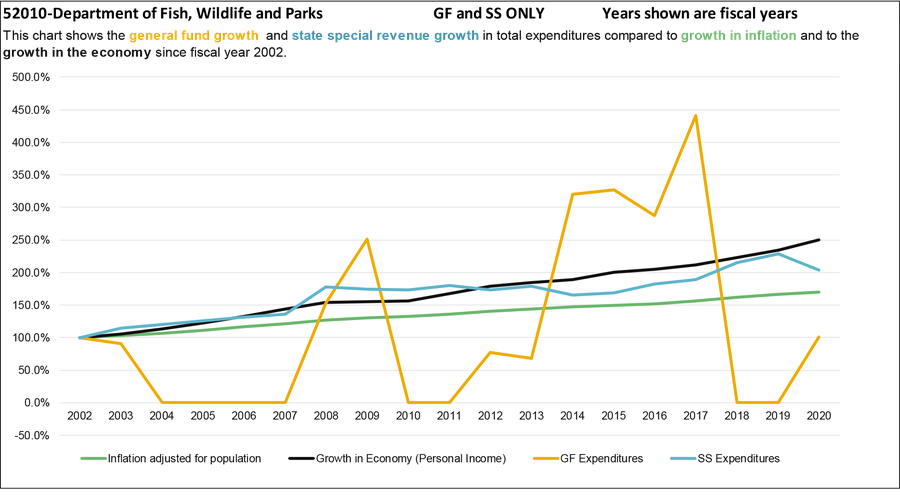Montana State Legislature
Department of Fish, Wildlife & Parks
The Department of Fish, Wildlife and Parks (FWP) manages Montana’s fish, wildlife, and recreational resources. Two, five-member, Governor-appointed commissions provide direction on issues related to land usage, preservation and management of resources, and establishment of licenses and fees.
Seven divisions form FWP and perform the following functions:
- The Fisheries Division preserves aquatic species to meet fishing and stewardship needs
- The Enforcement Division protects outdoor resources by ensuring compliance with Montana laws and regulations
- The Wildlife Division preserves wildlife species to meet hunting and stewardship needs
- The Parks Division preserves the state’s natural heritage and promotes recreational opportunities
- The Communication and Education Division coordinates the department’s information and outreach programs
- The Administration Division provides administrative support services to the entire department
- The Department Management Division provides managerial and policy support to the entire department
Below is an organizational chart of the branch, including full-time equivalent (FTE) numbers and the HB 2 base general fund appropriations and the total of all funds. Unless otherwise noted, all phone extensions are preceded by (406) 444.


This report includes a series of charts that compare expenditure growth to the growth in the economy and growth in inflation adjusted for population. Montana statute, 17-8-106, MCA, recommends using growth in personal income for comparison purposes. Personal income is a measure for growth in the economy. Comparing growth allows financial planners to consider past and future demands in services or changes in revenues.
The 2021 biennium appropriations show an increase in FY 2020 due to new long-range authority.
Historically, the Department of Fish, Wildlife and Parks is funded with state special revenue, and federal special revenue. From time to time the agency has been appropriated small amounts of general fund authorized through HB 2 and other legislation for AIS response accounting for less than one half of one percent of total expenditures. The ratio of state special to federal sources has been about 2:1 over the years with little fluctuation.

State Special Revenue
Annual growth in state special revenue during the period was 4.9% compared to an annual rate of inflation of 2.1% per year over the period. Most expenditures from state sources are appropriated through HB 2. Increases in total expenditures for FY 2020 and 2021 are due to appropriations for the Big Arm State Park Easement (HB 695) of $12 million and other long-range projects mostly for Habitat Montana projects, and capital projects within the Parks Division. Statutory appropriations include expenditures from the accommodation tax, FAS maintenance, and PILT and tax equivalency payments.
Federal Special Revenue
The main source of federal funding is from taxes on the sale of hunting and fishing equipment, and ammunition for hunting and sport shooters.
Capital Funds
HB 4 of the 2007 special session authorized expenditures for access Montana projects. Expenditures were between FY 2009 and FY 2015.
General fund
Appropriations for general fund are for Aquatic Invasive Species detection and response.
Legislative Changes
2019 Session
- HB 10 appropriates $2.5 million in state special revenue and $7.5 million in federal revenue to replace the Automated Licensing System. The agency may adjust appropriations between state special and federal special revenue funds if the total state special revenue authority is not increased by more than 10% of the total appropriation.
- HB 411 revises laws related to funding Aquatic Invasive Species (AIS) prevention. HB 411 creates a new fee imposed on out of state vessels, reduces the cost of the AIS pass for out of state anglers and makes make permanent the AIS pass for all anglers, allocates 1.4% of the lodging tax to the aquatic invasive species prevention, and changes fees charged to hydroelectric facilities for AIS prevention. The Aquatic Invasive Species state special revenue account receives all revenues and the balance is subject to legislative appropriation. HB 411 appropriates $4.9 million to FWP for AIS prevention.
- HB 695 appropriates $12.0 million from revenues generated by the sale of hunting and fishing licenses and certain fees derived from motor vehicle registration to purchase a permanent recreation easement at Big Arm state park from the Department of Natural Resources and Conservation.
2017 Session
- HB 97 increases the maximum payment to a landowner to participate in the hunter management program or hunting access enhancement program from $12,000 to $15,000
- HB 434 establishes Wildlife Habitat Improvement Act and a Wildlife Habitat Improvement Advisory Council, to be funded through federal funds designated for the control of noxious weeds and wildlife habitat restoration.
- SB 73 extends the sunset of the statutory appropriation of funds for the livestock loss mitigation restricted account to 2023
- SB 172 will prohibit the sale of hunting, fishing, or trapping licenses to any applicant that has failed to pay child support
- SB 218 enables hunters 18 and older to participate in the apprentice hunter program. Prior statute limited the apprentice program to hunters 10 years and older and under the age of 18. The bill also eliminates the ability of apprentice hunters to purchase black bear, mountain lion, and wolf licenses
- SB 363 creates a new electrical energy fee on hydroelectric facilities in the state and an invasive species fee for utilities. SB 363 also requires the purchase of aquatic invasive species prevention pass as a prerequisite to purchase a fishing license. Revenues are deposited in the invasive species special revenue account
2015 Session
- HB 140 changed the hunting and fishing fee license structure. As a part of this, the legislature eliminated some free licenses, raised license fees, and created an apprentice hunter certificate. These changes increased the total general license funds available for FWP to use.
- HB 167 increased the fees for non-resident off-highway vehicles, providing additional funds for FWP.
- HB 300 created a snowmobile pass for use on FWP maintained or funded trails. This provides additional funds for FWP.
2013 Session
- HB 609 provided for an interim study of hunting and fishing licensing to determine the long-term funding of FWP and its complexity of its hunting and fishing license structure.
- HB 401 revised certain hunting license application fees and allows per species collection of the preference system application fee.
- HB 586 appropriated $640,000 general fund over the biennium for prevention of aquatic invasive species.
- SB 200 revised laws related to wolf management. It authorized multiple licenses to hunt and trap wolves and landowners to kill wolves on private property without a hunting license.
2011 Session
- HB 370 increased the optional motor vehicle registration fee from $4 to $6 for operations and maintenance at state parks and Virginia and Nevada Cities.
- HB 621 revised the Montana Aquatic Invasive Species Act in which FWP is a participating agency, provided an appropriation, and authorized the establishment of quarantine measures through rulemaking, including mandatory inspections of interior portions of boats that contain water.
2009 Session
- SB 343 established the Montana Aquatic Invasive Species Act, requiring FWP to establish a mechanism for Montana to take concerted action to detect, control, and manage invasive species to prevent further introduction, importation, and infestation.
Click the double-sided arrow in the lower right corner of the image below to enlarge the graphic. Then, click the box next to the agency you want to see. To minimize, click Esc.
Legislative Studies
Environmental Quality Council interim work
Audit Reports
Performance Audit - Management of Montana's State Parks System - April 2018
Financial-Compliance Audit - Department of Fish, Wildlife and Parks - July 2020
Legislation
See the "Legislation" tab on the Environmental Quality Council web page
HB 202, Make certain special hunting licenses once-in-a-lifetime harvest
HB 224, Allow for the snaring of wolves in Montana by licensed trappers
HB 225, Establish wolf trapping season dates
HB 241, Revise hunting laws related to tribal boundaries
HB 242, Establishing a muzzleloader hunt season
HB 260, Revise non-resident fishing license fees
SB 143, Generally revise laws re Class B-10 and Class B-11 elk and deer licenses
HB 353, Authorize replacement hunting license when harvested game unfit for consumption
HB 605, Revise equestrian laws
SB 327, Revise waste of game law
SB 337, Revise laws related to grizzly bear relocation
SB 360, Revising laws related to fisheries management
HB 468, Allowing hound hunting and chase seasons for black bears
HB 417, Prohibiting limited permits in hunting districts w/over objective ungulate pops
HB 418, Establish the public lands access act
HB 505, Revising laws re: issuance of elk licenses used on private lands
HB 523, Revise laws related to snare traps on public lands
HB 524, Revise laws related to snare traps on public lands
SB 256, Revise hunter harassment laws
SB 306, Revise structure of fish and game commission
SB 267, Authorize reimbursement for wolf trapping and hunting
Agency profile information provided by the Legislative Fiscal Division.
